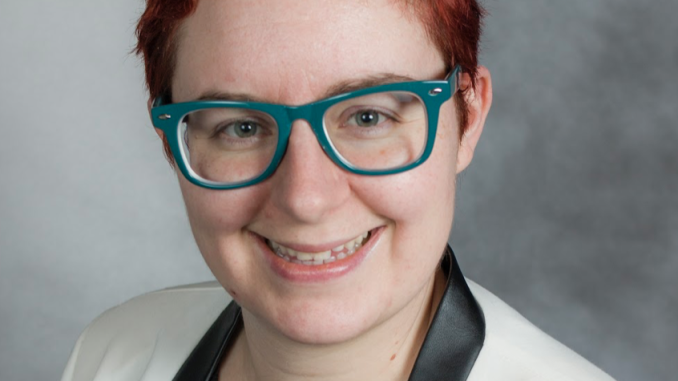
Jenna Smith (jesmith2@ursinus.edu)
Kara McShane has been a professor at Ursinus since 2014, but this year she was promoted to English department chair. Best known for her medieval literature class or her beautiful cat Freddie, McShane brings light and laughter to all her courses—and will continue to do so as department chair. The Grizzly had the pleasure to sit down and chat with her about this promotion.
Q: What are you most excited about being the new department head?
A: “I get to be a cheerleader for the English department. And that we have students and faculty that are doing astonishingly cool stuff —doing smart, engaged, committed, exciting work. In my opinion, in the English department, we aren’t always that good at celebrating that, it’s just what we do! We just develop new courses that are part of the curriculum and collaborate with departments across campus. Getting to do what I’ve always done but more so. To promote and encourage and help us be visible across campus and to external audiences. I get to talk everyone else up, it’s a nice thing!”
Q: What interests you about the job or position in the first place?
A: “First off, I’m spoiled. I’m in a department that works well and hard together and we also genuinely enjoy each other’s company. Part of it is the opportunity to advocate and be with and for my colleagues. I like to build stuff! We [the department] are building and rebuilding in the middle of a pandemic [so] that’s really exciting.”
Q: How do you manage your time and keep on top of your work given the new demands you have being a department head and a professor?
A: “You need a pretty good head for organization… and you need to like having a lot of things moving at once… have enough vision to see down the line, to see where those roadblocks are going to come up and try to anticipate that. If you know the crunch time is coming, you can manage it. Being prepared for the fact [that there will be some crunch times] but all of the same time management skills, that we are all always refining, really come into play.”
Q: What do you think is the most important part of your role?
A: “Advocacy for the department: for individuals, and the department as a whole. As a chair, you’re sort of in this in-between spot, you have to be thinking in some ways college wide [regular administrative concerns] but also your home is still always your department and so thinking about where and how we can advocate, and sometimes that’s small things. [The] individual level is important but also institutionally, where and how do we play into the life of the whole college. What’s our role, not only for majors but for everybody? [We see] lots of students who aren’t majors and so how do we have both a really robust program and make sure that every student who is encountering [the department] gets something meaningful.”
Q: What has been the most challenging part of the job?
A: “We’re all still trying to figure this out, in the middle of this weird world in which we find ourselves. There’s something really wonderful about coming back together in the ways that we can, and in safe and appropriate ways. It still feels like we’re trying to figure out how to rebuild the community in the midst of all this. So, figuring out how to navigate that return in a way that is safe and warm and inviting.”
Q: What are you planning on bringing to the department?
A: “We’re in a really exciting moment in the life of the whole department about where and how we want to reinvent ourselves. I’d like to see us have and to build out some of our really strong relationships with interdisciplinary programs [such as American/Africana studies and digital studies as well]. We historically have been really involved with gender, women, and sexuality studies. All of these fields are really important to what we do when we think about literature and culture, so I want to see us not just have those affiliations but really build that in ways that are exciting and in some ways the way of the future. Thinking about cross fields is important.”
